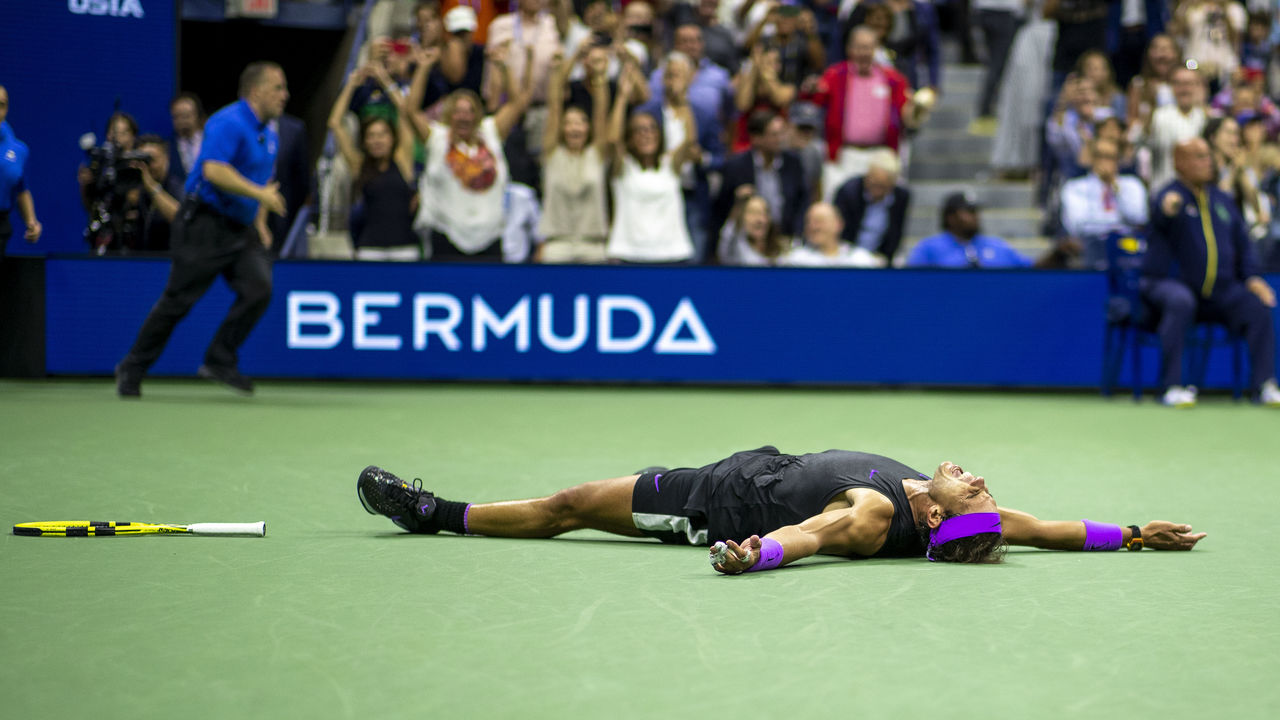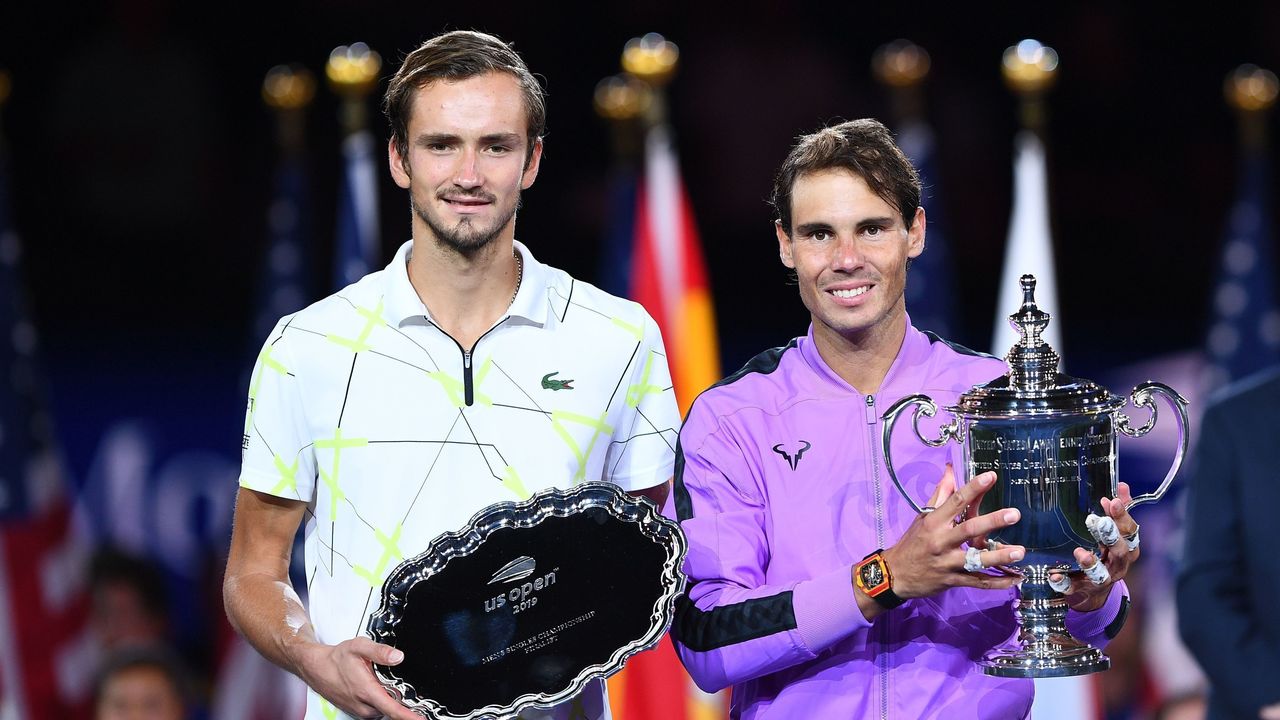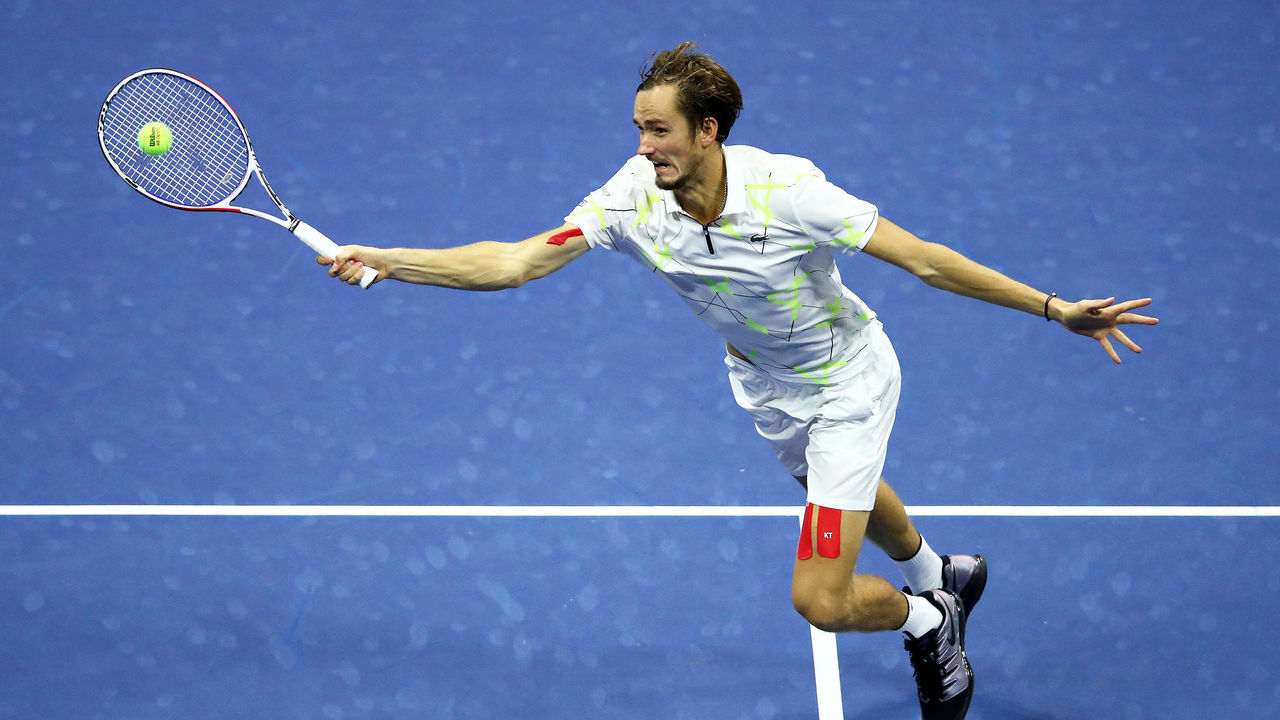Medvedev illuminates Nadal's gift for the unforgettable in US Open final
Entering the US Open final, Rafael Nadal had played in 26 Grand Slam finals, 17 of them against one of Roger Federer or Novak Djokovic. Of the other nine, he'd lost just one, to Stan Wawrinka in 2014.
Sunday's match pitted him against a new challenger, 23-year-old string bean Daniil Medvedev - breakout star of the summer, first-time Slam finalist, and occasional villain; he of the wonky strokes, unconventional shot pattern, and penchant for winning matches while appearing to teeter on the brink of physical collapse.
Precedent made Nadal an overwhelming favorite - not just because of his significant edge in experience and his history of dusting non-Big Three opponents in finals, but also his 6-3, 6-0 waxing of Medvedev in Montreal a month ago.
Though it started out looking as straightforward as expected, and though he did finally earn his 19th Grand Slam title, Nadal got far more than he bargained for. Everybody did.
Longevity is often confused for quality in men's tennis, but make no mistake, this match had both. It was four hours and 51 minutes of cat and mouse, adjustments and counter-adjustments, criss-crossing rallies, relentless retrieving, deft touch, and phenomenal net play. When it was over, Nadal was splayed out on his back behind his own baseline, dead exhausted, officially a four-time winner at Flushing Meadows.
For two sets and change, Medvedev - whose meteoric rise has been fueled by his tactical ingenuity - struggled to scheme around Nadal, an equally astute tactician with a few more weapons in his arsenal. There are guys who can hit through Nadal on the right day on the right surface, and one guy who's proven capable of outlasting him physically, but you'll basically never see him get outwitted on a court playing as slowly as Arthur Ashe was. His stamina, dexterity, and sheer kinetic force are more obvious to the naked eye than his tennis IQ, but those former attributes don't exist independently of the latter; his physical advantages afford him tactical options that are simply not available to others.

Medvedev, though, proved a surprisingly worthy adversary in both the mental and physical aspects of the match. The consistency of his groundstrokes, although he hits them so flat and low and with so little topspin, gives opponents fits. He extends rallies with defensive squash shots, does creative things with the ball when he's on the offensive, and zips around the court far more fluidly than his 6-foot-6 frame should permit.
Medvedev mixes paces and depths and rarely gives you a ball you can tee off on. He is unpredictable, sometimes to the point of recklessness. He's willing to try things other players are not, like repeatedly hitting 125-mph second serves in his Cincinnati semifinal against Djokovic in August, or busting out the serve-and-volley on second serve when down championship point to Nadal on Sunday.
He started making hay in the third set when he decided he had nothing to lose and amped up his aggressiveness while Nadal started to tighten up. He played four consecutive spectacular points to break Nadal at love and win the third set, and he broke from 15-40 down at 5-4 to win the fourth set. Nadal was 204-1 in best-of-five matches after winning the first two sets, but the memory of that one loss - which had come on this very court against Fabio Fognini four years earlier - started to creep in. He looked to be fading, while Medvedev seemed to be getting stronger.
Nadal has always presented something of a contradiction: A ferocious and unforgiving player, he can simultaneously be a wobbly and unreliable closer. He gets tight at the finish line of big matches, but he also gets bolder and exploits his opponents' nerves when he senses them tightening up in those same spots. The finish line often winds up feeling like a tease, appearing and vanishing like a mirage in the desert. Just kidding, you're not done dragging your weary bones across the burning sands just yet.
That's how you end up with a fifth set in which both guys look dead in the water at some moments and in complete command at others. Nadal fended off three break points in his opening service game; broke Medvedev from 40-0 down three games later; double-faulted to get broken while serving for the match at 5-2; got down break point while serving for it again at 5-4; and finally punched through on his third championship point.
Wobbles and all, Nadal has an innate ability to elevate the competitiveness of a match; to raise the stakes, to make each game and point feel more urgent than they otherwise might. For a decade and a half, he's been forcing opponents to run a few extra steps, hit a few more balls, push themselves past their limits. Those opponents tend to have two choices: Rise to meet Nadal's level of intensity, or get off the stage.
Jimmy Connors on the grounds. Love his line about about Nadal: "Even at this stage in career, he plays like he's broke." #USOpen
— Jon Wertheim (@jon_wertheim) September 8, 2019
Because of the way he competes - and, in some cases, the way he struggles to close - Nadal has been part of more memorable Grand Slam matches than any other player. Those matches haven't just come against fellow members of the Big Three, either.
Sure, there was the 2008 Wimbledon final against Roger Federer, and the 2012 Australian Open final and 2013 French Open and 2018 Wimbledon semifinals against Djokovic. But there were also the two Aussie Open epics against Fernando Verdasco, the US Open barnburners against Fognini and Lucas Pouille, the semifinal against Grigor Dimitrov in Melbourne, the unbearably tense 28-game fifth set against Gilles Muller at the All England Club, and the breathtaking quarterfinal against Juan Martin del Potro there last year.
You can add Sunday's marathon to the ledger - possibly at the very top.
"This victory means a lot, especially the way that the match became so difficult, so tough," Nadal said in his on-court podium interview. "Was able to hold, at the end, the nerves, because the nerves were so high after having the match almost under control and then, 5-2, 5-4, break points. A crazy match."

Medvedev confessed he'd had one hand one the runner-up plate and his mind on his consolation speech when he trailed by two sets and a break.
"When I was a break down, I was thinking, 'OK, in 20 minutes I have to give a speech, what do I say?'" he admitted after the match. "And I was like, 'OK, OK, just fight for every point, don't worry about this.'"
Improbably, he got a spiritual lift from the crowd - this time, not from their denigration, but from their support. Over the final three sets, he became the sentimental favorite. He drew equivalent if not louder applause than Nadal - who got booed early in the fifth set for consistently slowing the pace of play. At one point, the crowd started chanting Medvedev's name, the way an inspired Russian crowd threw its support behind Rocky Balboa in "Rocky IV."
Chants for Medvedev and jeers for Nadal. What kind of odds do you think could've gotten if you'd put money on that a week ago, when Medvedev was getting showered with boos every match?
"Getting the crowd back, I should be surprised, but I was being myself, I was fighting for every point," said Medvedev. He'd drawn the ire of the Flushing Meadows faithful when he was shown angrily snatching a towel from a ball boy and then not-so-covertly flipping the crowd the bird during a third-round match against Feliciano Lopez.
"I think they appreciated it, because being a break down in the third, I won the game, and I felt that these guys wanted some more tennis. They were cheering me up like crazy. And I knew I had to leave my heart out there for them also. And I think they saw it and they appreciated it, and I'm thankful to them for this."
He embraced the villain role for a while, but also told reporters that it didn't reflect who he really was. And as comfortable as he seemed to be playing the heel, he seemed happier to be charming the converted crowd with the runner-up speech he delivered nearly three hours after he first started thinking about what to say.
Previous ugly incidents - in 2016, Medvedev implied that a black chair umpire was biased in favor of his black opponent, and in 2017, he tossed coins at an umpire's feet after a loss - leave a much worse taste than the impishness he displayed in the Lopez match. But he insists he's a changed person, and the tennis world certainly seems prepared to believe and embrace him.
This was the 12th straight Slam won by a member of the Big Three, and the sport remains in their collective palm until further notice. But this final offered far more encouragement about the viability of a potential new guard than anything we've seen to this point. With his quirky and savagely effective game, fighting spirit, and perhaps even winning personality, Medvedev could be the guy who finally bridges the generation gap. Coming within a hair's breadth of stunning Nadal in New York was the culmination of an astonishing hardcourt summer in which he made the finals in Washington and Montreal and won at Cincinnati.

Famously, no active player currently under the age of 30 has won a Slam on the men's tour. No one under that age had even done what Medvedev did on Sunday, which is win two sets in a Slam final. Medvedev, for now, seems like the rare young guy who can handle the physical and mental demands of hanging with those three guys in a best-of-five. For long portions of this match, he looked like the fresher - and calmer - player.
"Daniil created this moment, too," Nadal said. "Because the way that he fought, the way that he played, was the champion way. I really believe that he will have many more chances."
In the end, though, this was Nadal's moment. As he sat in his chair awaiting the trophy presentation, the 33-year-old looked up at the big screen in the stadium, watched a video montage of his 19 major victories, and wept.
"We are getting old," Nadal said, when asked what had made him so emotional. "And in some way that's good. To see all the things that I went though and to be able to still be here, is so special for me. I went through some tough moments, physically especially. And when you have physical issues, then mentally things become much more difficult. So, the emotions were there watching all the success, all the moments that came to my mind."
It feels like the Spaniard doesn't get brought up in the GOAT conversation as often as Federer and Djokovic do, perhaps because for a long time he was seen as a one-surface pony who fattened up on French Open titles. But he now owns seven Slams on non-clay surfaces and sits just one behind Federer in the overall tally.
Nadal, for what it's worth, insists that particular chase doesn't interest him.
"I would love to be the one who wins more, but I am not thinking or going to practice every day or playing tennis for it," he said. "I am playing tennis because I love to play tennis. I can't just think about Grand Slams. Tennis is more than Grand Slams. I play to be happy. … All the things that I achieved in my career are much more than what I ever thought and what I ever dreamed. I would love to be the one who has more, yes, but I really believe that I will not be happier or less happy if that happens or (does) not happen."
When they're all done playing, people will be free to judge Nadal and his two legendary peers by whatever criteria they choose. Grand Slam titles may be the most popular measuring stick but, as Nadal says, tennis is more than just Grand Slams. For some, the distinction may be anecdotal; not a number, but a feeling.
As much as all the hardware he's accumulated, Nadal's legacy is bound up in these epic matches and indelible moments he's been a part of. Nobody has engendered more feeling on a tennis court. And that, ultimately, is what he'll be remembered for.
Joe Wolfond writes about basketball and tennis for theScore.
HEADLINES
- ATP trying to help Medvedev leave Dubai after travel shutdown
- Medvedev collects Dubai title after Griekspoor withdraws with injury
- Tennis Australia's Craig Tiley to become CEO of USTA
- Roddick joining ESPN's coverage of Wimbledon, US Open
- Alcaraz takes down Fils in less than an hour to claim Qatar Open title